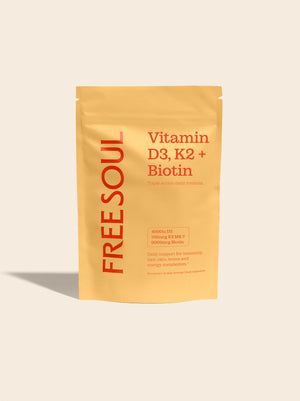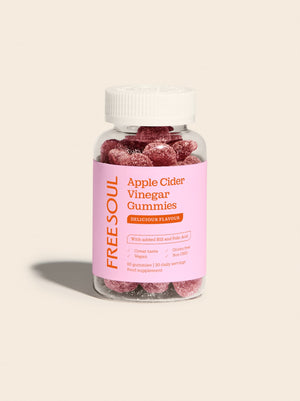We’ve all felt bloated after an indulgent meal but pain, discomfort or a regular change in your bathroom habits isn’t something you ‘just’ have to live with. 1 in 20 British adults suffer from Irritable bowel syndrome (IBS), with data showing that the condition is actually more prevalent in women. According to the National Institute of Health women report more frequent and severe IBS symptoms around the time of menstruating. Frustratingly, IBS is often overlooked by doctors, so we’ve spoken to some leading gut health experts and an IBS Nutritionist and FodMap Dietitian, to discover exactly what you need to know…
There’s a vast range of causes and symptoms associated with IBS, including stress and food groups, which can often leave sufferers feeling confused and helpless. We spoke to Clarissa, Gut Health & IBS Nutritionist, to get the answers that you (and a few members of the Free Soul team) have been asking for.
What is IBS?
IBS is a chronic condition that affects the large intestine and can cause a variety of symptoms such as abdominal pain, bloating, constipation, and diarrhoea.
The exact cause of IBS is unknown, but several factors that may contribute to its development can include:
- Abnormalities in gut muscle contractions
- Abnormalities in an individual’s gut bacteria
- Increased sensitivity to pain in the gut
- Psychological stress
- Food intolerances or sensitivities
- Hormonal changes in women
- A previous gastrointestinal infection
- Dysbiosis – an imbalance of bacteria in the gut – common post antibiotic or certain medication use
- Family history of IBS
- SIBO – small intestinal bacterial overgrowth
How common is IBS?
In the UK, IBS affects around 10-20% of the population. This prevalence may vary depending on factors such as age, gender, and ethnicity. Studies have shown that IBS is more common in women than men, with a female-to-male ratio of around 2:1. It is also more common in younger adults, with the highest prevalence rates reported in individuals between the ages of 20 and 40.
Overall, IBS is a significant health burden in the UK, with a considerable impact on the quality of life of IBS patients. Despite its high prevalence, many people with IBS do not seek medical attention or receive a proper diagnosis due to the social stigma associated with the disorder or the belief that the symptoms are not severe enough to warrant medical intervention.
What are the most common symptoms?
- Abdominal pain or discomfort: This is usually experienced in the lower abdomen and can range from mild to severe. The pain is often relieved by passing stool or gas.
- Changes in bowel habits: IBS can cause constipation, diarrhoea, or a combination of both. Some people may have alternating periods of constipation and diarrhoea.
- Bloating and gas: Many people with IBS experience bloating and increased gas production, which can cause discomfort and abdominal distension.
- Mucus in the stool: In some cases, people with IBS may notice mucus in their stool, which can be a sign of inflammation in the digestive tract.
- Urgency and incomplete bowel movements: Some individuals with IBS may feel an urgent need to pass stool, but then have difficulty with incomplete evacuation.
- Nausea and fatigue: IBS can cause nausea and fatigue, especially if the symptoms are severe or long-lasting.
How do you know if you have IBS?
An IBS diagnosis can be complicated as symptoms can vary greatly from person to person, and can also change over time. This makes it difficult for practitioners to diagnose based on symptoms alone.
There is also no specific test for IBS, and diagnostic tests such as blood tests or imaging studies are typically normal in people with IBS.
IBS symptoms can often overlap with other conditions such as inflammatory bowel disease, and hormonal conditions such as endometriosis, celiac disease, and certain infections. These conditions need to be ruled out before making a diagnosis of IBS.
How can you treat IBS?
Whilst doctors have a good understanding of the symptoms and potential triggers of IBS, the underlying mechanisms that could be triggering the IBS may not be explored, making it challenging for doctors to determine the best course of treatment for each individual patient.
Medications are often given to clients, but are not always effective and can also trigger negative side effects such as constipation, diarrhoea, bloating or abdominal pain.
A Nutritional Therapist who specialises in gut health can provide individualised dietary recommendations and support for managing IBS symptoms. They can help identify food triggers, rule out other conditions, provide guidance on eating patterns, and suggest supplements to help alleviate symptoms. They may also use functional testing to address underlying imbalances that may contribute to IBS.
Can you cure IBS?
There is no current cure for IBS, but the symptoms can often be effectively managed with various treatments and support from a gut health specialist.
How do I help my IBS?
Stress is a known trigger for IBS symptoms, and is thought to impact the gut-brain axis through the release of stress hormones. Stress can also alter the composition of the gut microbiome, leading to dysbiosis, or an imbalance of beneficial and harmful bacteria in the gut. Incorporate stress management techniques such as deep breathing, yoga, walking in nature or journaling.
Chew. Digestion begins in the mouth, so try to chew each mouthful of food to the consistency of apple puree.
Slow down. Eating quickly can mean we miss our hunger and satiety cues as well as sending food into the gut partially undigested. Put your fork and knife down between each bite and aim for 10-20 minutes to eat your meal.
For some individuals with IBS, simple dietary changes can make all the difference when it comes to symptom management. However, it’s important to make any big dietary changes under the guidance and supervision of a Nutritionist. Dietary changes can often negatively affect symptoms when not done in the right circumstances or under the guidance of a professional, so always work with a specialist.
How do you ease the pain of IBS symptoms?
There are several ways to ease the pain and discomfort associated with IBS symptoms. Here are some tips that may help:
- Use heat therapy: Placing a heating pad or hot water bottle on the abdomen can help to relieve abdominal pain and cramping.
- Try relaxation techniques: Stress can worsen IBS symptoms, so practising relaxation techniques such as deep breathing, meditation, or yoga may help to reduce stress and improve symptoms.
- Identify trigger foods: Certain foods may trigger IBS symptoms in some people, such as dairy, gluten, or high-fat foods. Keeping a food diary can help to identify trigger foods and avoid them.
- Exercise regularly: Exercise can help to reduce stress, improve bowel function, and relieve symptoms of IBS. Opt for gentle forms of exercise such as Pilates and yoga, as high-intensity exercise can actually exacerbate symptoms in some people with IBS due to the activation of the sympathetic nervous system, which can cause changes in gut motility and blood flow, leading to worsened symptoms.
What should I not do if I have IBS?
- Try not to skip meals: Skipping meals can trigger IBS symptoms in some people. It is important to eat 3 regular, balanced meals throughout the day, with an aim to leave 3-5 hour intervals between each meal and snack.
- Avoid trigger foods: Certain foods can trigger IBS symptoms in some people, such as fatty or spicy foods, gluten, dairy, alcohol, caffeine, and artificial sweeteners. It is important to identify your trigger foods and avoid them as much as possible. But please note full elimination diets should not be followed long term and done alongside a nutrition professional.
- Avoid eating overly large meals: Eating large meals can put additional strain on your digestive system, which can trigger IBS symptoms. Aim for balanced plates with ½ of your plate veggies, ¼ of your plate complex carbs and ¼ of your plate lean protein.
- Don't ignore the urge to have a bowel movement: Ignoring the urge to have a bowel movement can lead to constipation, which can worsen IBS symptoms.
- Consider HOW you eat: Slow down, be present and chew your food as thoroughly as you can to support the digestion process.
What may trigger IBS?
Certain foods may trigger IBS symptoms in some people, so avoiding any known triggers is key. In addition, the impact of stress on the gut can also make symptoms worse.
Other potential triggers can include:
- Hormonal changes: Women may experience worsened IBS symptoms during their menstrual cycle.
- Medications: Some medications may trigger IBS symptoms in some people, such as antibiotics, antacids, and antidepressants.
- Infections: Some people may develop IBS symptoms after a gastrointestinal infection, such as gastroenteritis.
- Changes in gut bacteria: Changes in the gut microbiome may contribute to the development of IBS symptoms in some people.
- Stress
A big thanks to Clarissa for her knowledge and expertise.
Want to hear more of her expertise? Find Clarissa on Instagram!
We had the pleasure of speaking to The Field Doctor’s co-founder and leading dietician, Sasha Watkins. Sasha answered a few questions more specifically targeted for female health.
Why are women more prone to IBS?
The occurrence of IBS seems to be related to sex and age. Looking at the data, the prevalence of IBS in women declines after the age of 40 whereas it stays relatively stable for men aged 20-69 years. Studies suggest that this may be due to female sex hormones, mainly oestrogen and progesterone, as these play a pivotal role in triggering symptoms, especially during reproductive years.
How might hormones affect IBS?
Sex hormone receptors along the gastrointestinal tract affect gut microbiota and motility during menstruation and may increase the severity of symptoms across certain phases of the menstrual cycle. Fluctuation in female sex hormones may also influence our emotional response such as stress, anxiety and depression through the gut brain axis. This can significantly worsen quality of life, levels of fatigue and general mood in women with IBS.
Is there a link between IBS and endometriosis?
There is some evidence of a link between endometriosis and IBS. Women with endometriosis are 2-3 times more likely to have IBS compared to women without the condition. It is thought that having endometriosis may increase inflammation in the abdominal area and hyper visceral sensitivity in the gut (increasing the feeling of pain).
What is a low FODMAP diet?
This type of diet is otherwise known as a diet low in fermentable carbohydrates. It has been found to have a positive impact on symptoms for some people with IBS. The low FODMAP diet is a process of reducing the fermentable carbohydrates and re-introducing them to find out which group or groups are causing the symptoms. It is not a diet for life, and it is recommended to be carried out under the supervision of a trained Dietitian.
Many thanks to the Field Doctor for educating us around the taboo subject of IBS. Discover more of their ibs-friendly range Field Doctor.
Frustratingly, there is no quick fix to curing IBS but, it is worth noting down the top tips from our female experts to help manage your IBS symptoms. If you’re still worried it is always best to follow up with your GP for a diagnosis, especially if you have a higher risk of developing IBS. Remember to prioritise your health, and if something doesn't feel right push with your doctor for more guidance.







